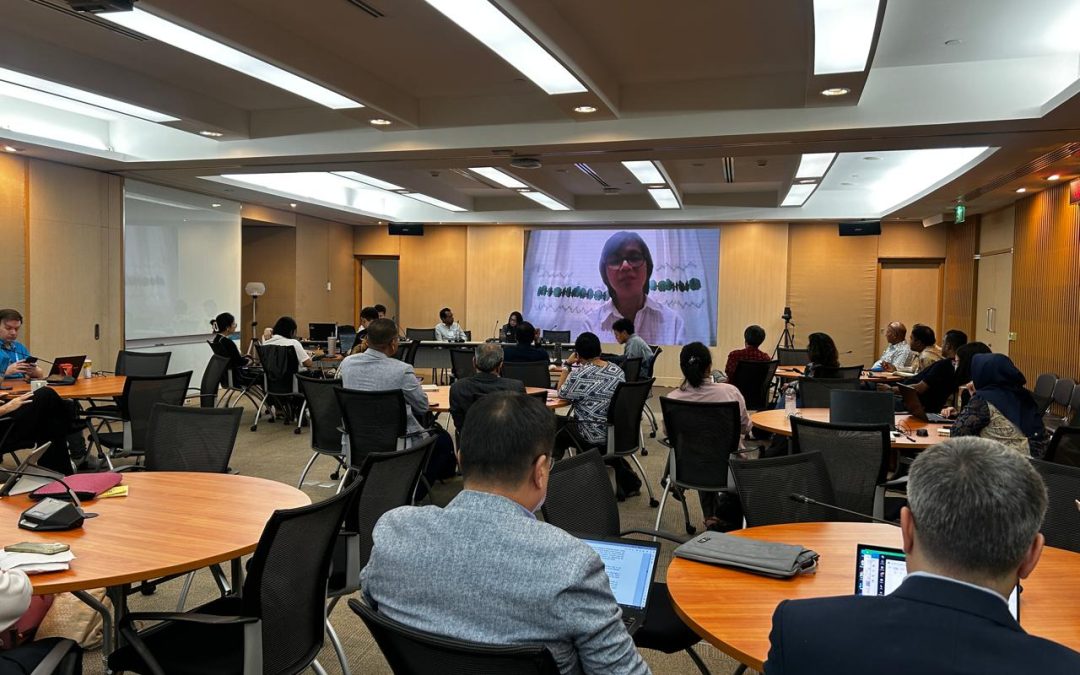At the sidelines of the recently held 11th Asia Pacific Forum on Sustainable Development (APFSD), the Asia Pacific Regional CSO Engagement Mechanism (APRCEM) NGO Constituency organized a side-event, “A Localization Roadmap to Reach the Furthest Behind: How localization can contribute in achieving SDG 17 and the 2030 Agenda” last February 23, 2024.
The side-event aimed to develop a roadmap for the localization agenda in the region, which can help advance people’s development priorities, address current gaps in existing approaches, and make progress in strengthening development partnerships. As this year’s APFSD addresses the “triple challenge” of climate, poverty, and hunger, it is imperative to also assess how localization could contribute in accelerating the Agenda 2030.
A people-centered outlook and approach
Worsening and persistent crises on climate, poverty, economy, livelihood, human rights, and overall development propel Asia Pacific on the insufferable verge of conflict, fragility, and upheaval. The forum revealed a concerning regression of the world towards achieving the SDGs, particularly SDGs 1 (no poverty), 2 (zero hunger), 13 (climate action), 16 (peace, justice, and strong institutions), and 17 (partnerships for the goals).
This sends an alarming signal to development actors to further strengthen policies and programs, as well as re-evaluate existing approaches in the overall landscape pertaining to Agenda 2030, and highlight the importance of a people-led localization approach in achieving this. Despite rhetoric of the United Nations (UN) and other donor country governments in forwarding the localization agenda, gaps in the framework and implementation still exist, and it is most perceived in the smallest and farthest communities of the region.
During the side-event panel discussion, Jahangir Masum, Chairperson of the Reality of Aid – Asia Pacific (RoA-AP), highlighted that in the process of localization, there should be an intention to shift the “power relationship” between donors and partners in development cooperation. Masum also emphasized that instead of treating partners as beneficiaries, communities should be considered as active actors in their own right as well. “The current state of localization agenda reinforces local power elites and captures local development. Any localization roadmap should put local voices in leading development,” Masum stressed.
Meanwhile, Jennifer Guste of the Council for People’s Development Governance (CPDG), called for a people-centered, people-led, human rights-based development framework. She argued that even before the SDGs, grassroots-based organizations in the Philippines have long been promoting people-centered, community-based development programs. “Such programs and projects are based on the needs of communities, identified by them, planned, and implemented with their participation.” This aligns well with the objective of localization to ensure that policies and programs are according to communities’ priorities and needs.
Representing the United Nations Economic and Social Commission for Asia and the Pacific (UNESCAP), Sanjeevani Singh focused on the digital side of the discussion. Pointing out the quality and impact of Voluntary Local Reviews (VLRs) across local and regional governments, Singh underscored that data is a key area in implementing these VLRs. “Data collection and management remain significant challenges for many local governments, seeing the need to build capacity. This will help in developing protocols, addressing data gaps, and better supporting the integration of data collected at local events and by citizens.”
Lessons on localization
The main panel discussion reflected on the importance of putting communities and its people at the center of the localization agenda, treating them as the main drivers to formulate, plan, and implement people-led programs that would be genuinely beneficial to them. In an attempt to define what a localization agenda means for CSOs in the region, the panel and audience from various sectors shared their perspectives on advancing a people-centered and democratic localization agenda, which addresses the current gaps related to power structure, ownership of development by communities, and data challenges in monitoring development.
First, there is a need to decolonize existing policies and practices of development to allow community-led and CSO-envisioned roadmap to exist in the first place. It must be rooted and cultivated through local representation, catering to and accounting for the specific needs and priorities of communities. Moreover, this constitutes treating indigenous knowledge as a primary reference in addressing social issues. A participant underscored that strengthening peoples’ organizations is a fundamental requirement in ensuring that SDGs will serve its core purpose of addressing development challenges across the region.
Second, a participative, collaborative, and inclusive approach should be upheld for communities to assert themselves on development projects that are repressing their fundamental rights. This also solidifies their role as development actors and protects them from being sidelined during the process. An important example argued by Mrinal Kanti Tripura of Maleya Foundation and Amina Khatun of Plan International Asia Pacific Hub is to leverage the power of young people so they can meaningfully engage with local governments and can flourish in spaces where they can lead, formulate, and participate.
Lastly, localization should be championed by local state actors. Local governments should forward people-centered policies and practices that are vital in supporting and sustaining people-centered development programs. Supporting progressive local leaders, policy makers, and legislators in championing locally-led development helps them in leading and reforming backward policies and practices for the benefit of their constituencies.
Trekking the Summit of the Future
On a wider scale, the 11th APFSD is one of the many avenues serving as a base camp for the Summit of the Future happening on September 22-23, 2024. It is touted as a space for the UN, other multilateral institutions, donor and partner governments, and civil society to discuss better ways to accelerate the progress and respond to the implementation struggles of the Agenda 2030. As all eyes are on the summit, civil society is now eagle-eyed in challenging the existing policies which caused the alarming regression of the SDGs. The world now awaits if the summit will live up to its “Pact for the Future” or create a steeper path for civic society and the broader social movements. If it attempts to reach new heights, how will it ever reach those who were already left behind?

